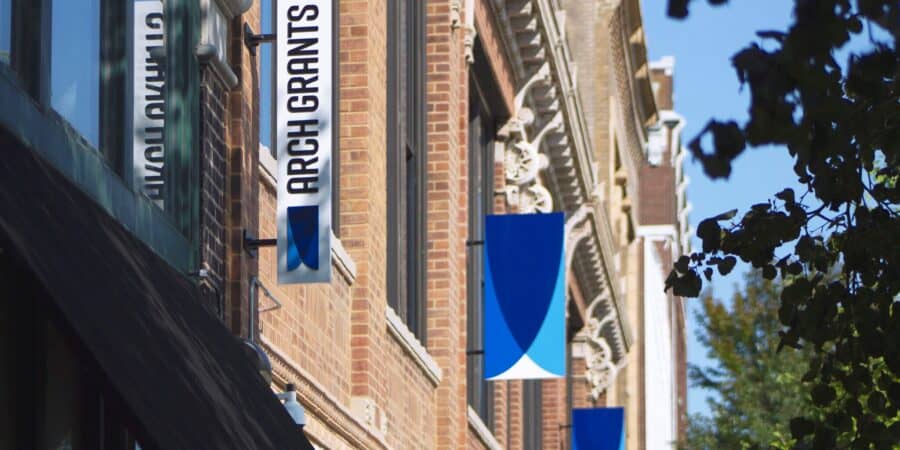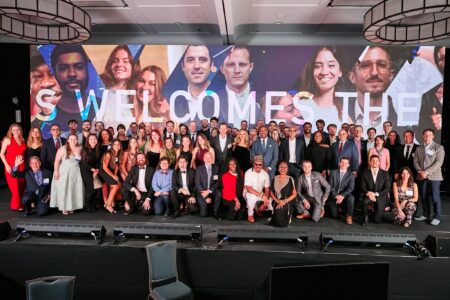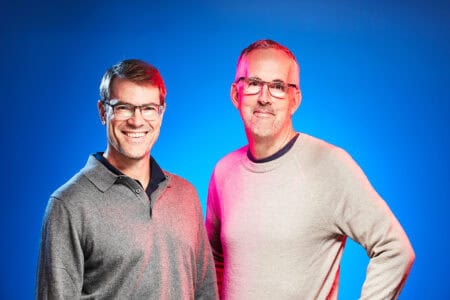News & Media
Arch Grants Founders, In Their Own Words

In the heart of St. Louis, a quiet revolution is taking place. Since 2012, Arch Grants has awarded over $18.5 million in non-dilutive funding to 272 early-stage startups, collectively generating more than $1.2 billion in revenue and creating over 4,000 jobs in the region. Behind these impressive numbers are the entrepreneurs themselves, visionaries who chose our city as the canvas for their ambitions. Below, we hear directly from the Arch Grants Founders who are reshaping our economy and community. Their unfiltered accounts reveal not just the triumphs, but the struggles, doubts, and relentless drive that define their St. Louis journeys.
The Spark of Creation
Every entrepreneurial journey begins with a moment of clarity. A problem becomes so evident, so pressing, so annoying that inaction is no longer an option. Our Founders have each experienced that decisive moment when they saw what others missed and felt compelled to build something new, regardless of the risks. Their companies’ origin stories reveal not just business opportunities, but personal missions that demanded to be pursued, often against conventional wisdom and comfortable alternatives.
Joss Fernandez, MD, FACS, Founder and Chief Medical Officer, MaxFi: As a surgeon, I wanted to safely learn new procedures, but I couldn’t accept that patients should bear the burden of my learning curve. Wait, you want me to perform that procedure after just watching it once? That really bothered me. I was already making a good living as a surgeon, so this wasn’t about money. I saw a gap no one was addressing: how to train doctors safely and effectively without compromising patient safety. I thought, “Maybe this is my chance to do something great.”
Alyssa Huffman, CEO, ALLUMIN8: Our company was born from heartbreak. I watched loved ones suffer after failed spine surgeries. No one was solving the root problems, so I left a stable career and stepped into the unknown. I didn’t plan to be a founder, but after ten years of market analysis and the bottom falling out personally—divorce, brain injury from a car wreck, losing job, and more—I decided to bet on myself and ensure I didn’t leave this world with regrets.
Andrew Barnell, CEO and Co-Founder, Geneoscopy: My sister Erica, Geneoscopy Co-Founder, conducted research at WashU on stool RNA and gut inflammation and that started the journey. Then, her experience with a patient unable to get screened for colorectal cancer due to work constraints highlighted the need for a simpler solution. This led to Geneoscopy and ColoSense, our noninvasive, stool-based test for colorectal cancer screening. Our mission is to ensure that early detection and better GI health are within everyone’s reach.
Kelley Robson, Founder and CEO, Pivto Better Learning: I saw healthcare training stuck in the past—dull webinars and endless PowerPoints, and I knew we could make learning engaging and effective. I quit a stable job to build an organization that transforms complex topics into easily-consumed media experiences. No one else was blending learning psychology with cutting-edge media like us. Our vision is to empower healthcare organizations with knowledge that sticks.
Richard Clark, CEO, AirSeal CardioVascular: Our company was born from an unexpected discovery in Dr. Mohamed Zayed’s lab: circulating fatty acid synthase in patients with peripheral arterial disease (PAD). I was deeply compelled by this, both scientifically and personally, as my father was one of the 70,000 patients annually in the U.S. diagnosed too late and required urgent amputation.
Pierre Paul, Co-Founder and CEO, We Hear You, Inc.: Growing up as an immigrant, my family and I experienced firsthand what it feels like to be outside the status quo. We faced a lot of racism, xenophobia, and poverty in a place that was foreign to me. That became my why. I didn’t start We Hear You to build gadgets—I started it to build dignity.
Luis Manta, Founder, Seoul Juice: While playing soccer at Saint Louis University, I had an allergic reaction to a popular sports drink. I realized there weren’t many clean hydration options on the market. That moment flipped a switch in me. I wasn’t forced into entrepreneurship; I was pulled into it by a real need I personally experienced.
Weathering the Storm
The entrepreneurial path is rarely linear, often interrupted by unforeseen obstacles that test both business models and personal resolve. From unexpected market shifts to funding crises, regulatory hurdles to global disruptions, our Founders have navigated waters that would sink less determined vessels. Their candid accounts of these pivotal challenges, and how they summoned the resilience to overcome them, offer a glimpse into the gritty reality behind every success story.
Michael Seaman, Co-Founder, Swipesum: Early on, we nearly ran out of money on several occasions. I remember the first W2 as a Swipesum employee being less than my quarterly bonus’ at my previous job, questioning if I was cut out for this. But we all kept showing up, pitching clients, and perfecting the software and process. We refined our vision, landed key deals, and continued to build. It was brutal, but we learned how to survive and then thrive.
Clark: Over the last eighteen months, we’ve faced the tough realities of building a diagnostic company: limited capital, strategic ambiguity, and the steep climb of early-stage fundraising. There were moments of doubt—internally and externally—but we stayed grounded in the mission. Today, we have traction with advisors, investors, and partners. We’re not naïve. There’s still more to learn, but we now see a clear path to transforming how peripheral arterial disease is diagnosed.
Bethanie Couri, Ed.D, Co-Founder, We Hear You, Inc.: Early on, we had no funding, no manufacturer, and barely a prototype—just a belief in what we were building. I cold-called 100+ facilities, pitching without a product in hand. It wasn’t easy, but we eventually found good people who stood in our corner. We leaned on resilience, stayed present in community conversations, and kept showing up.
Drew Carter, Co-Founder, Whistle Rewards: Just six months after our launch, we were sued for allegedly breaching a non-compete clause. What began as a cordial heads-up phone call devolved into an expensive legal battle, one that consumed half our fledgling balance sheet in legal fees.
Manta: One of the biggest challenges was trying to launch a beverage company with no industry experience, no big investors, while still a college student in school. I doubted myself plenty of times.
Tim Luchini, Founder and CEO, Intramotev: Hiring ten new people at once and getting them onboarded is a challenge I’m facing this week! You get a one or two-hour interview and then you’re getting married to them. The early teammates in a smaller business have an outsized impact.
The Fire Within
What separates entrepreneurs from dreamers is the relentless drive to transform vision into reality… day after day, obstacle after obstacle. This distinctive blend of competitiveness, ambition, tenacity, and sometimes sheer stubbornness distinguishes Founders who build lasting companies. Whether forged in childhood experiences, professional frustrations, or deeply personal missions, their inner motivations fuel the marathon of entrepreneurship when others might abandon the race.
Carter: Founding a company is much like signing up for an endurance race: the idea is simple, but the execution tests your mental grit far more than your physical stamina. I liken founders to the lead sled dogs in the Iditarod—charging into the unknown, undeterred by discomfort, pulling the entire team forward. Success hinges on embracing both the terror and the ecstasy, keeping the end goal always in view, and refusing to let temporary setbacks define your journey.
Fernandez: I think there’s a grit factor. As a cardiac surgeon, grit is essential—you need it to get through years of intense training and the pressure of long, high-stakes cases. Entrepreneurs need that same grit to push through uncertainty and setbacks. But grit isn’t just blind optimism. Real grit means facing the facts, analyzing every painful detail, and solving problems head-on. You don’t just hope things will work out—you make them work. That mindset, forged in the operating room, is what keeps me going when quitting would be easier.
Seaman: I was raised in a family that believed you earn your success. I was a college athlete, and I treat business like sport: show up, compete, and outwork everyone. But the real fuel is my team. When you build something together, quitting isn’t an option. I want to win for all of us.
Clark: At times, I’ve been tempted to walk away—but entrepreneurship demands grit, and sometimes it’s just stubborn pride that keeps you grinding forward. There are weeks it feels like three steps back, but the small wins—those quiet validations—add up, and then you look back and realize how far you’ve climbed.
Huffman: The truth is that the team and I are just messengers in something much greater than ourselves. Some days are full of highs and others are all about lows. Most days, however, we feel like a true industry mover. If we stay faithful to the mission, the right doors will open.
Paul: My drive comes from my family. I watched my parents raise us with joy in the face of hardship. I’m not fearless, but I’m relentless, which I have learned is essential when running a startup. We don’t quit; we pivot.
Luchini: You have to be willing to quit your job and take a risk. So making no money for a while and being willing to say, “I don’t know for certain that this will work.” But I typically have a pretty good inclination that things will fail up or will fall in the direction of progress.
The Arch Grants Effect
At a critical juncture in every startup’s life, the right support can mean the difference between breakthrough and breakdown. Beyond providing crucial non-dilutive capital, Arch Grants connects entrepreneurs to a powerful ecosystem of mentors, potential investors, customers, and talent. We help forge lasting connections between Founders and the broader St. Louis community, supporting everything from hiring needs to visa applications for international entrepreneurs. Here, our Founders reflect on how that multifaceted support transformed their trajectory.
Sarah Schlafly, Founder, Mighty Cricket: The initial grant was huge in our ability to hire talent. Since then, we’ve been able to grow significantly and obtain nearly $1 million in government funding.
Carter: For a founder, isolation is the most insidious challenge. You’re breaking new ground, hearing “no” constantly, and wondering if anyone truly understands. Arch Grants served as our lighthouse, providing a thriving community of fellow entrepreneurs who’d walked a mile in our shoes. Having a peer network to swap war stories with, share tactical advice, and simply commiserate transformed our startup journey from a solitary slog into a collaborative adventure.
Manta: Arch Grants is the reason Seoul Juice got into Schnucks. We met Ted Schnuck during Finalist Pitch Day and that drastically changed the trajectory of my business. It made me feel like I wasn’t building this thing alone.
Seaman: Arch Grants believed in us early and before most anyone. The money mattered, but the credibility and community were even more valuable. It gave us our start in St. Louis and helped to land customers, investors, and talent. We’re still here because of that early belief in what we were building.
Barnell: Our relationship with Arch Grants was pivotal for us. That early non-dilutive funding was crucial because it was the first time we brought external capital into the business, which we needed to invest in research and development. However, it wasn’t just about the money. The Arch Grants network of mentors and fellow founders offered invaluable support and connections within the local ecosystem. This early belief in Geneoscopy and the resources facilitated by Arch Grants were instrumental in our growth and our ability to take our business to the next level.
Robson: Arch Grants funding enabled us to fund our video production studio. We now have a beautiful, modern facility in midtown St. Louis and we complete our video projects with a 100% in-house team.
Huffman: Arch Grants gave us more than funding. It gave us belief. At a critical time, that belief gave us room to breathe, build, and belong.
Ripples of Change
The ultimate measure of entrepreneurial success extends beyond balance sheets to the tangible differences made in people’s lives. Collectively, Arch Grants companies have paid over $230 million in wages to Missouri employees and raised $870 million in follow-on capital, impressive economic indicators that represent thousands of individual stories. From creating quality jobs to developing innovative solutions that address social challenges, our companies are weaving themselves into the fabric of St. Louis while reaching far beyond our region.
Seaman: Swipesum helps companies make smarter decisions about payments, saving millions in fees while improving customer experience. But I’m most proud that we’ve created high-paying jobs in St. Louis and built a company that feels like an Olympic Team.
Barnell: We are building a great company culture in St. Louis, creating jobs and advancing the local life sciences industry. What drives us is ColoSense’s potential to change lives. Helping people take control of their health is what we are deeply proud of.
Robson: I am extremely proud of the impact our education projects have on society. For example, we recently completed educational content for SANE nurses (Sexual Assault Nurse Examiners) so that they are better able to provide services to survivors of sexual assault in our community.
Huffman: We’re showing that innovation with heart and science can start in St. Louis and change the world.
Couri: We’re breaking down barriers. In St. Louis, we’re making historic buildings more accessible. We’re partnering with Assisted Living Facilities to restore independence. We take our impact personally: more freedom, more access, more dignity.
Luchini: It’s a ton of fun. It’s like kids two-to-four years old playing with toy trucks and tractors in the sandbox. Except I’m grown up and playing with the biggest train set you could ever have running around your Christmas tree.
Schlafly: I’m proud of our growth and impact in educating the market. It’s not easy to get Americans to eat bugs.
Horizons Ahead
Vision doesn’t end with initial success but rather evolves and expands. As our companies mature, the ambitions for growth reflect not just corporate milestones but aspirations for a broader impact on industries, communities, and lives. These forward-looking perspectives offer a preview of St. Louis’ entrepreneurial future and the role these visionary Founders intend to play in shaping it.
Michael Cox, Founder, StepStuds: The most exciting aspect about being an entrepreneur is that ANYTHING can happen at ANY time! I dream that my product will be picked up not only by large distributors in the United States, but also the three “Big Box” stores Home Depot, Lowes, and Menards.
Carter: We’re doubling down on product innovation (think embedded safety nudges, real-time analytics, and gamified milestones) and scaling our partnerships with Fortune 5000 firms committed to long-term cultural transformation. Ultimately, we want every eligible worker to carry a Whistle Rewards card in their wallet.
Couri: We’re building a future where accessibility is the default—not an afterthought. I want We Hear You to be known as the company that reimagined how the world thinks about access, starting with doors.
Clark: From St. Louis to the world, we’re creating something that will outlast us, and we’re proud to have this community with us on the journey.


